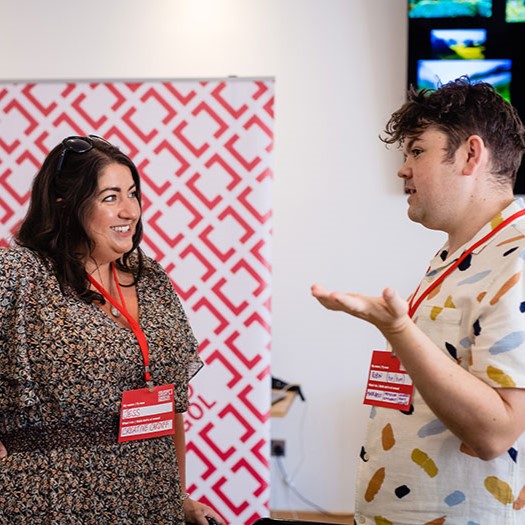
Tell us about yourself and your creative background
I initially discovered Cardiff’s creative scene through poetry after regularly attending poetry events, like Where I’m Coming From. By attending and contributing to these events, I started to meet the creative community and develop my own ideas in terms of my creative ambitions.
Because we live in such a small country, it’s so easy to connect with creative people across Wales so I started to think of new ways of sharing my ideas, outside of poetry. Firstly, I got involved with S4C, specifically with Hansh, creating a video on Controversial tips for Welsh learners. Through my work with Hansh, I got a taste of video and I liked that the output was suddenly not to a room of 20 people, but thousands of viewers. I also wanted to connect with non-Welsh speakers to share my ideas on Welsh identity and Welsh language, so I approached BBC Sesh with some other content I wanted to create. They got back to me, and I was then able to do some videos with them through lockdown. It was during this time that I decided to go ahead and create my own podcast.
So, what’s your Creative First?
My Creative First is Sgwrsio, a Welsh language podcast for learners by learners. I wanted to celebrate and showcase the voices of Welsh learners around the world after discovering a massive learner community on Twitter, Facebook and Instagram.
I wanted to show people my lived reality with the Welsh language. I think confidence can sometimes be a problem with second – and first – language speakers so I wanted to show people ‘Hey, I speak the language and I make mistakes, sometimes I ask what the word is and – to those who don’t speak Welsh as a first language- that you can communicate, can laugh, can get to know each other and it doesn’t have to be perfect’. Confidence and fluency don’t mean accuracy- you do not have to be accurate to communicate in any language.
What was the biggest challenge you faced?
The first challenge was working out how do you begin a podcast? I wanted to do it on a budget, so I bought a £50 mic and used free podcast platform RedCircle to upload my episodes and Audacity to edit for free. One of the biggest challenges was teaching myself to use those platforms, especially the editing. The quality, I'm glad to say, has improved and that just took time.
Finding speakers was also a challenge, especially finding new people on a regular basis. Trying to approach learners who you don’t know is sometimes difficult as they don’t think their Welsh is good enough to be on the podcast, although I know they could definitely do it. Having said that, there’s such a large variety of groups and individuals on Twitter, Facebook and Instagram, and I just directly approach them. Now I’ve got a catalogue of episodes, it looks legitimate, like a proper podcast, so makes approaching speakers much easier.
You can hear Nick’s full answer to this question in the audio clip at the bottom of this article
Can you share tips for others who want to create their own podcast?
-
YouTube is your friend: there’s so many useful tutorials out there to help you create your podcast, I used YouTube to learn how to edit and find software to use.
-
Be passionate about your topic: podcasts take a lot of time to create and your enthusiasm for the topic should drive you. That passion comes through when you’re talking about something- if you find the subject boring, you’re going to sound bored.
-
Record a few episodes before releasing your first- people will lose interest if you release one and take 6 months to share your next one. Have at least three to go that you can release monthly, and you can plan and produce the next ones whilst sharing those.
Looking back, is there anything you would’ve done differently?
I wouldn’t change anything – it was a learning experience- and I've enjoyed the learning aspect of it and the creative process of developing my podcast skills.
Why choose Cardiff for your Creative First?
Cardiff is incredibly exciting- it's small, but punches like a capital city does. It’s got so much going on, in the Welsh and English language creative communities. The industry in Cardiff is vibrant, and small enough that it’s easy to connect with people. I got Ellis Lloyd Jones to be part of my podcast, he’s Welsh speaking and a big TikTok star, a humble and lovely guy who gave his time up to do a podcast with me, and I’ve bumped into him in Cardiff a few times after this.
What is really refreshing about Cardiff is that you’re not a number, you’re a name. It’s easy to network and the community is really supportive. I feel so positive about Cardiff’s creative scene and am really excited by it.
Hear a clip from our interview, where Nick talks about the practical elements of creating a podcast
Follow Sgwrsio on social media:
Sgwrsio is available on Y Pod, Spotify, iTunes, Amazon podcasts, Google Podcasts, YouTube and more
Creative Firsts feature
Want to be featured? Email us at creativecardiff@cardiff.ac.uk if you have a Creative First (first time industry experience) to share with our community.


